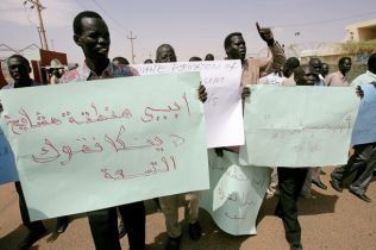Abyei community remains determined to vote in October
October 9, 2013 (JUBA) – In a bid to capture the attention of the international community, citizens of the oil-contested border region of Abyei took to the streets in large numbers on Tuesday, expressing their readiness to cast their vote this month.

“Our demands remain unchanged. The month of October, 2013, remains as our sacred deadline for holding [the] Abyei referendum on self-determination and if it is not honoured then the Ngok Dinka chiefdoms will organise their [own] popular referendum”, the letter said, a copy of which was obtained by Sudan Tribune.
The Abyei community has rejected calls by the African Union Peace and Security Council (AUPSC), which has appealed to both Sudan and South Sudan not to take “unilateral action”, saying it does not apply to the Ngok Dinka chiefdoms.
After Khartoum and Juba failure to reach an agreement over who can participate in a referendum to determine the fate of the region. The head of the African Union mediation proposed last year to hold a vote without the participation of the Sudanese nomads of Misseriya tribe.
Sudan rejected the proposition, reminding that the same mediation had filed a different proposal providing to divide the disputed region between the two countries in case they fail to reach an agreement.
Abyei traditional leaders and elite now say the Permanent Court of Arbitration in The Hague stated in its final and binding rule of 22 July 2009 that the land belong to the nine chiefdoms of the Ngok Dinka.
So, in line with this rule, they reject to form a joint administration with the Misseriya and they would organise unilaterally a vote to decide the fate of the area.
The letter maintains that the Ngok Dinka chiefdoms are prepared to go ahead with the referendum without the involvement of the Sudanese and South Sudanese governments.
The letter further states it would hold the AU body responsible should the conflict escalate further as a result of its failure to take decisive action to break the deadlock.
“The African Union Peace and Security Council shall bear the responsibility for any escalation and tension that may arise during or in the aftermath of the upcoming popular referendum”, the groups said.
“However, we call upon United Nations Interim Security Force for Abyei to step up its civil protection component in order to provide necessary protection for the voting centres during the popular referendum”, the letter adds.
The demonstrators called for the full, immediate and unconditional withdrawal of troops from the Sudan Armed Forces (SAF), which have remained in northern areas of Abyei in defiance of a resolution passed by the United Nations Security Council (UNSC).
“We strongly call upon [the] AU and UNISFA to ensure [the] full withdrawal of [the] SAF from various areas within Abyei borders, especially those stationed in Diffra (Kech) oil fields”, the group said.
The letter said troops in Diffra should pull out with immediate effect, calling on the AUPSC to ensure the Sudanese government complies with the UNSC resolution number 204.
Luka Biong Deng, a senior member of the governing Sudan People’s Liberation Movement (SPLM) from the area, said the future of Abyei was at a “crossroad”.
“With political stalemate, the people of Abyei are left with no other option but to self-determine the final status of their area”, said Deng, who remains an influential figure despite resigning his ministerial position in 2011.
(ST)
